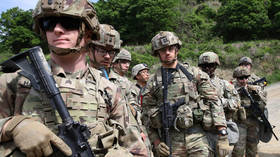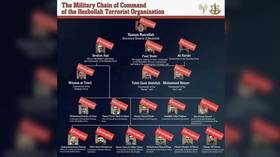US mulls boosting its forces in Middle East – NBC

The US is considering increasing its military presence in the Middle East after an Israeli airstrike killed Hezbollah political leader Hassan Nasrallah, NBC News reported on Saturday, citing sources.
According to two unnamed US officials, the US military has presented Defense Secretary Lloyd Austin with options for moving additional forces to the region. The defense secretary later reportedly discussed the change of posture with US President Joe Biden and national security officials.
The outlet said that while no immediate decisions were made, Austin has the authority to send in additional forces.
Earlier this month, the Pentagon already moved to reinforce its military presence in the Middle East as tensions between Iran-backed Hezbollah and Israel were soaring. There are currently around 40,000 US troops in the region, including over a dozen warships.
US officials told the network that the Pentagon considers these forces adequate for the potential challenges, but could extend some current deployments or make adjustments in air defense and other capabilities. The US is also prepared to support an emergency evacuation of American civilians from the region if necessary, the article said.
Tensions in the Middle East escalated on Saturday after Israel conducted an airstrike on a Hezbollah compound in Beirut, killing Nasrallah, the Islamist group’s long-time leader and sworn enemy of the Jewish state. Officials in West Jerusalem also claim to have wiped out nearly all of Hezbollah’s military leaders over the past few weeks.
Following Nasrallah’s assassination, Hezbollah pledged to continue “its jihad in confronting the enemy, in support of Gaza and Palestine.”
Iranian Supreme Leader Ayatollah Ali Khamenei warned that “the blood of the martyr will not go unavenged.”
The Israel Defense Forces (IDF) has said it is ready to repel a potential retaliation, with the military placed “on high alert.” Unnamed US officials told the Washington Post that the Biden administration is also bracing for an escalation, adding that it is “difficult to predict what might follow in the coming days,” with the main risk being Iran’s response to the assassination.
US officials have also complained that they had no prior warning from Israel about its plot to kill Nasrallah, and that they were caught off guard by an alleged Israeli operation to detonate pagers and portable radios that killed and maimed dozens of Hezbollah members earlier this month.













